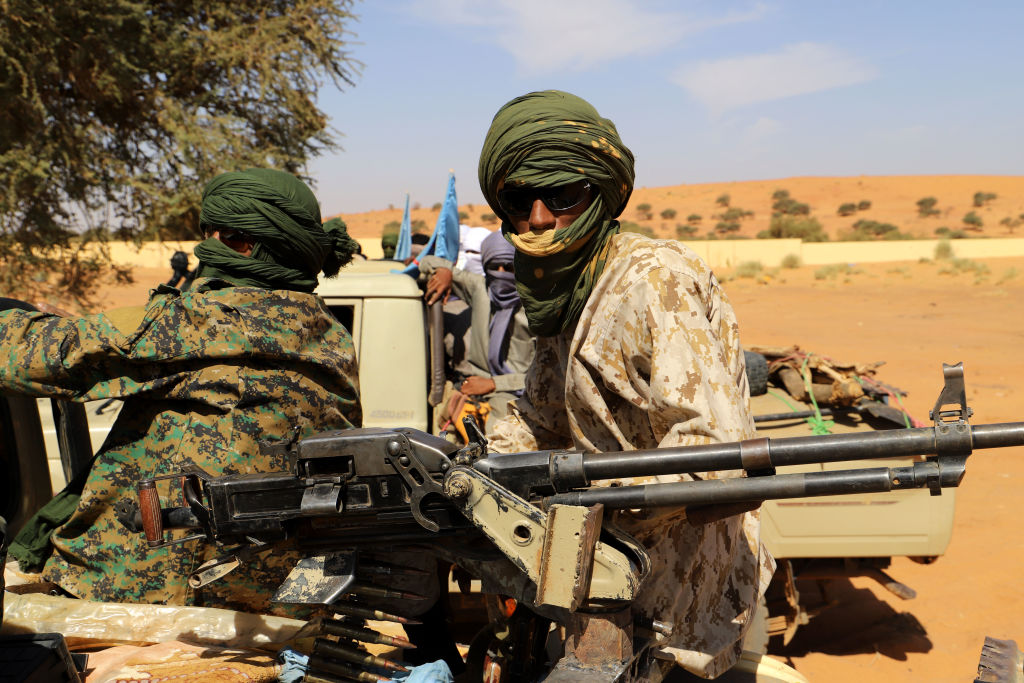ADF STAFF
Mali’s ruling junta has repeatedly pledged to restore peace to the country after using the terror threat as justification for coups in 2020 and 2021. But violence in the country has risen steadily over the past year and it shows no signs of slowing.
From mid-2022 to mid-2023, violent events linked to “militant Islamist groups” rose to 1,024, up from 862 such events over the previous time frame, according to a report by the Africa Center for Strategic Studies. The violent events, launched by terrorist groups linked to al-Qaida and the Islamic State group (IS), include attacks on security forces and civilians.
“Mali is on pace to see over 1,000 violent events involving militant Islamist groups in 2023, eclipsing last year’s record levels of violence and a nearly three-fold increase from when the junta seized power in 2020,” the ACSS report said.
In the first half of 2023, there were 16 episodes of “militant Islamist violence” within 150 kilometers of Bamako, the nation’s capital, compared to five such events in the previous six months. Since 2021, violence against civilians has surged 278% with more than 1,600 recorded fatalities, the report showed.
Armed men opened fire on a United Nations Multidimensional Integrated Stabilization Mission in Mali (MINUSMA) logistics convoy in early July. The attack in northern Mali triggered a fierce firefight during which a tanker was overturned, injuring a civilian.
The ambush came less than a week after the United Nations Security Council unanimously voted to end MINUSMA’s 10-year operation after Mali’s military junta, led by Col. Assimi Goïta, asked the 13,000-strong force to leave “without delay.”
Last year, French troops left the country, ending a nine-year operation, as relations between the two countries declined. Also in 2022, Mali left the G5 Sahel Joint Force, a collaborative regional effort to combat terrorism. The move was deemed “unfortunate” and “regrettable” by Martha Pobee, the U.N.’s Assistant Secretary-General for Africa.
As foreign troops leave Mali, a battleground has emerged between rival extremist groups vying for territory previously patrolled by U.N. forces.
“Several areas are now under de facto control of militant Islamist groups where they exact brutal justice such as executions and amputations,” according to the ACSS.
Those groups — notably Jama’at Nusrat al-Islam wal-Muslimin (JNIM), which is linked to al-Qaida, and the Islamic State Greater Sahel (ISGS) — commonly fight among themselves when they are not attacking security forces and civilians.
On June 4, ISGS militants amputated a hand and foot of two men the group accused of cattle rustling in the village of Inkadewane in the Menaka region. “The militants also threatened that this form of sentence will be applied throughout the region,” the ACSS report said.
In early March, JNIM used four car bombs during a fight with ISGS in the Manaka region. The same month, ISGS fighters assaulted merchants, torched bicycles and merchandise, and stole vehicles from a market in the Timbuktu region that the ISGS ordered closed, but JNIM wanted to remain open, according to the report.
As MINUSMA and French troops left Mali, Russia’s Wagner Group of mercenaries entered at a cost of nearly $11 million a month to provide to provide security and training — while also exploiting gold mining.
But instead of stemming the bloodshed, the group seems to be causing it. Overall, 71% of Wagner’s engagement in political violence in Mali has taken the form of attacks targeting civilians, according to the Armed Conflict Location & Event Data Project.
The group has targeted civilians during attacks in the Mopti, Koulikoro, Segou and Timbuktu regions. Hundreds of civilians died in those attacks, which included the massacre of more than 500 civilians in Moura in the Mopti region in March 2022.
Villager Alou Diallo knows firsthand the destruction that often follow Wagner’s bootsteps. This year, the group invaded his village in central Mali, torching houses and shooting people suspected of being extremists.
Diallo ran to safety, but his son wasn’t as fortunate. He was shot while fleeing and finished off in the dirt.
“I watched my 16-year-old son die,” Diallo told The Associated Press in Bamako, where he fled to a refugee camp. “I really want peace to return and things to go back to normal. Here in Bamako, I live a life I didn’t choose.”

